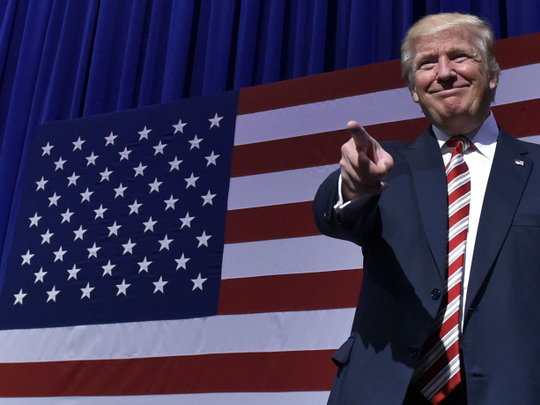
Washington: Professor Allan Lichtman, who’s correctly predicted every presidential election since 1984, is placing his bets on Republican nominee Donald Trump to clinch the title this year.
Lichtman, a distinguished professor of history at American University, sat down with us this week to reveal who he thinks will win in November, and why 2016 was the most difficult election to predict yet.
Can you tell me about the keys, and how you use them to evaluate the election from the point where — I assume it’s very murky a year or two out — and they start to crystallise over the course of the election.
‘The Keys to the White House’ is an historically-based prediction system. I derived the system by looking at every American presidential election from 1860 to 1980, and have since used the system to correctly predict the outcomes of all eight American presidential elections from 1984 to 2012.
The keys are 13 true/false questions, where an answer of “true” always favours the re-election of the party holding the White House, in this case the Democrats. And the keys are phrased to reflect the basic theory that elections are primarily judgements on the performance of the party holding the White House. And if six or more of the 13 keys are false — that is, they go against the party in power — they lose. If fewer than six are false, the party in power gets four more years.
So people who hear just the surface-level argument there might say, well, President Obama has a 58 per cent approval rating, doesn’t that mean the Democrats are a shoo-in? Why is that wrong?
It absolutely does not mean the Democrats are a shoo-in. First of all, one of my keys is whether or not the sitting president is running for re-election, and right away, they are down that key. Another one of my keys is whether or not the candidate of the White House party is, like Obama was in 2008, charismatic. Hillary Clinton doesn’t fit the bill.
The keys have nothing to do with presidential approval polls or horse-race polls, with one exception, and that is to assess the possibility of a significant third-party campaign.
What about Donald Trump on the other side? He’s not affiliated with the sitting party, but has his campaign been an enigma in terms of your ability to assess this election?
Donald Trump has made this the most difficult election to assess since 1984. We have never before seen a candidate like Donald Trump, and Donald Trump may well break patterns of history that have held since 1860.
We’ve never before seen a candidate who’s spent his life enriching himself at the expense of others. He’s the first candidate in our history to be a serial fabricator, making up things as he goes along. Even when he tells the truth, such as, ‘Barack Obama really was born in the US,’ he adds two lines, that Hillary Clinton started the birther movement, and that he finished it, even though when Barack Obama put out his birth certificate, he didn’t believe it. We’ve never had a candidate before who not just once, but twice, in a thinly disguised way, has incited violence against an opponent. We’ve never had a candidate before who’s invited a hostile foreign power to meddle in American elections. We’ve never had a candidate before who’s threatened to start a war by blowing ships out of the water in the Arabian Gulf if they come too close to us. We’ve never had a candidate before who has embraced as a role model a murderous, hostile foreign dictator. Given all of these exceptions that Donald Trump represents, he may well shatter patterns of history that have held for more than 150 years, lose this election even if the historical circumstances favour it.
Do you think the fact that Trump is not a traditional Republican — certainly not an establishment Republican, from a rhetorical or policy perspective — contributes to that uncertainty over where he fits in with the standard methodology for evaluating the Keys?
I think the fact that he’s a bit of a maverick, and nobody knows where he stands on policy, because he’s constantly shifting. I defy anyone to say what his immigration policy is, what his policy is on banning Muslims, or whoever, from entering the United States, that’s certainly a factor. But it’s more his history in Trump University, the Trump Institute, his bankruptcies, the charitable foundation, and all of the lies and dangerous things he’s said in this campaign, that could make him a precedent-shattering candidate.
It’s interesting, I don’t use the polls, as I’ve just explained, but the polls have very recently tightened. Clinton is less ahead than she was before, but it’s not because Trump is rising, it’s because Clinton is falling. He’s still around 39 per cent in the polls. You can’t win if you can’t crack 40 per cent.
And, of course, as I have said for over 30 years, predictions are not endorsements. My prediction is based off a scientific system. It does not necessarily represent, in any way, shape or form, an Allan Lichtman or American University endorsement of any candidate. And of course, as a successful forecaster, I’ve predicted in almost equal measure both Republican and Democratic victories.












